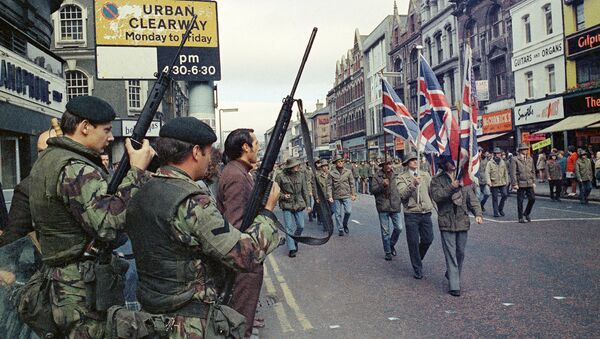“Operation Yellowhammer,” a British government dossier leaked to the press on Sunday, detailed some of the government’s expectations about the fallout from Britain potentially leaving the EU on October 31 without a negotiated deal for a post-Brexit relationship with the European Union.
Fuel shortages, price spikes and protests and road blockages that could "require significant amounts of police resource[s]" are all considered possibilities, the document notes. Of particular concern is the return of a hard border between Ireland and Northern Ireland, the latter of which is a part of the United Kingdom. There are currently no barriers to travel between the two parts of the island, and the dispute over whether or not such a barrier is politically acceptable has gummed up Brexit negotiations almost since Brexit was set in motion by a June 2016 referendum.
An option of last resort, which has proven equally contentious, is the “backstop,” or moving of the hard border to the Irish Sea - a scenario that would leave Northern Ireland in the EU customs union, but no other part of the UK.
Jess Cobbett, a policy adviser in London, told Radio Sputnik’s By Any Means Necessary Monday that the report “highlighted things that we’re already anticipating are going to be pretty horrendous” and that she hoped it “highlights the issue to people who haven’t really been … wary of them.”
“The idea that Boris Johnson can renegotiate, not only with one of the hardest lines that the EU had, but to completely change it so that this gets rid of the backstop … it’s just not going to happen,” Cobbett told hosts Eugene Puryear and Sean Blackmon.
Noting the recent passing of the 50-year anniversary of the beginning of the Troubles in Ireland, Cobbett said that the worst-case scenario for a no-deal Brexit is “something that cannot be looked at lightly. The tensions are nowhere near where they were, but they’re still there; they still exist between Northern Ireland and Ireland, and the government has a responsibility to protect that and to make sure that that doesn’t exacerbate anything.”
A 30-year period of violence began in Northern Ireland in August 1969 at the Battle of Bogside, when pro-London Unionist police clashed with the Catholic and pro-Dublin Derry Citizens’ Defense Association during a parade in Derry that celebrated a Protestant English victory over Catholic Irish forces in 1689.
The resultant years of terrorism, guerrilla warfare and heavy-handed state repression saw 3,489 people killed and an estimated 107,000 injured before the Good Friday Agreement stemmed the violence in 1998.
Cobbett called it “careless” and “a disaster across the board” for Johnson to gamble Britain’s fate on his own ability to defeat Brussels in a game of Brexit chicken. “They are not going to budge, especially on such a big issue.”
With a parliamentary majority of a single MP, Cobbett said Johnson was “not in a strong position,” despite the success of the Brexit Party in recent European Parliament elections, and the risk of a general election is real.
“This is absolutely likely to happen,” she said, noting Labour would likely soon call a “vote of no confidence in the government, which is much more significant than calling it in Boris Johnson, which is basically just a showy thing. The government has a real chance of losing, and if that were the case, an interim government or even a general election would certainly shake things up. It would likely be an extension of Article 50, which I think the European Union would be in favor for, if there were such a significant change as a general election and a potential change in leadership and, therefore, a change in the negotiation tactics.”
Cobbett noted that “if we do leave without a deal and it has a colossal impact,” the Scottish independence movement might be given a serious kick to seek separation from the UK in the interests of remaining in the European Union, having failed to do so in a 2014 referendum. “This is something, though, that the Labour Party has said that they wouldn’t support … I just don’t think, though, any other country within the Union has a say in the matter, given how horrendous Brexit has been going and how it’s actually been the worst-case scenario time and time again. So I can absolutely see that as a discussion that keeps happening.”

